A WRITER'S WIT |
Texas Tech University Library:
1.7 Million Volumes Strong
 Texas Tech University Library | Photo by TTU
Texas Tech University Library | Photo by TTU TOMORROW: How the Library of Congress Helped Me Organize My Library
Texas Tech University Library: |
A WRITER'S WIT |
 Reading Room, Southwestern College Library, c1966 | Photo from 1967 Moundbuilder Yearbook
Reading Room, Southwestern College Library, c1966 | Photo from 1967 Moundbuilder Yearbook A WRITER'S WIT |
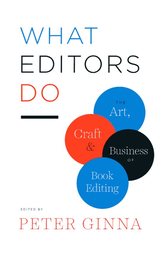
1. “The Other Side of the Desk: What I learned about Editing
When I Became a Literary Agent,” by Susan Rabiner.
“It’s the value added by the author to what is essentially a set of facts, stories, and commentary in search of a larger meaning. To conceptualize is to link these facts, stories, and commentary to a compelling point. A successful book proposal offers to take the reader on a journey. It may be one he has taken, in some form, many times before. An author’s concept for the book is her promise [is] that with the benefit of new research, new stories, new insights, and her authorial guiding vision, the reader will see new things on the journey and arrive at a new destination—and even, at the end, be changed by the experience” (77).
2. “The Half-Open Door: Independent Publishing and
Community,” by Jeff Shotts.
“There is now, as a result, a vast commercial enterprise around book publishing, where annual profits are valued above cultural currency, books are spoken of in terms of ‘units,’ and readers are sorted by algorithm into categories by which they can be told with increasing accuracy just what it is they want. Commercial values have conflated quantity with quality, and commercial publishers are forced to create the appearance of quality, if there is none, in service of quantity. High advances and movie deals make the news, as do celebrity authors and their book parties and television appearances” (142).
3. “Marginalia: On Editing General Nonfiction,” by Matt
Weiland.
“I also remind the reader that clarity is king. ‘There is nothing that requires more precision, and purity of express, than to write in a familiar style,’ as the great English essayist William Hazlitt put it nearly two hundred years ago. ‘To write as anyone would speak in common conversation who had a thorough command and choice of words, or who could discourse with ease, force,and perspicuity. . .’ To me these are the cardinal virtues of strong, convincing English prose. (Hazlitt’s last term, meaning ‘clarity,’ is now, alas, an antique word)” (173).
I've wanted to be a writer since I was a boy, though it seemed an unlikely outcome since I showed no real talent. But I persevered and eventually found my own row to hoe. Ignorance of other writers' work keeps me from discouragement and I am less well-read than the average bus driver. |
A WRITER'S WIT |

A WRITER'S WIT |
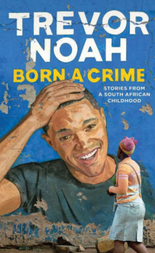
A WRITER'S WIT |

A WRITER'S WIT |
***—Excellent
** —Above Average
* —Average
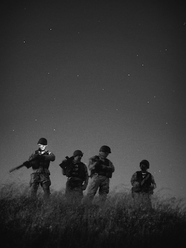 Carlos Javier Ortiz
Carlos Javier Ortiz A WRITER'S WIT |

A WRITER'S WIT |
Each weekend I try to view selected portions of C-SPAN’s Book-TV, forty-eight straight hours of recorded author readings of nonfiction now hitting the shelves, and sometimes six- or eight-hour segments covering book festivals around the US. C-SPAN, by the way, is supported by most cable and satellite TV providers, so check your listings. You can also view at any time any reading at Book-TV’s Web site. And if you do wish to tune in, you can view, download, and print a copy of the weekend’s schedule off the Web site. Please find below a presentation I believe to be of interest to a broad audience.
A WRITER'S WIT |
Each weekend I try to view selected portions of C-SPAN’s Book-TV, forty-eight straight hours of recorded author readings of nonfiction now hitting the shelves, and sometimes six- or eight-hour segments covering book festivals around the US. C-SPAN, by the way, is supported by most cable and satellite TV providers, so check your listings. You can also view at any time any reading at Book-TV’s Web site. And if you do wish to tune in, you can view, download, and print a copy of the weekend’s schedule off the Web site. Please find below a presentation that recently affected me very deeply.
A WRITER'S WIT |
Each weekend I try to view selected portions of C-SPAN’s Book-TV, forty-eight straight hours of recorded author readings of nonfiction now hitting the shelves, and sometimes six- or eight-hour segments covering book festivals around the US. C-SPAN, by the way, is supported by most cable and satellite TV providers, so check your listings. You can also view at any time any reading at Book-TV’s Web site. And if you do wish to tune in, you can view, download, and print a copy of the weekend’s schedule off the Web site. Please find below one presentation that recently piqued my interest.
A WRITER'S WIT |
Each weekend I try to view selected portions of C-SPAN’s Book-TV, forty-eight straight hours of recorded author readings of nonfiction now hitting the shelves, and sometimes six- or eight-hour segments covering book festivals around the US. C-SPAN, by the way, is supported by most cable and satellite TV providers, so check your listings. You can also view at any time any reading at Book-TV’s Web site. And if you do wish to tune in, you can view, download, and print a copy of the weekend’s schedule off the Web site. Please find below two presentations that recently piqued my interest.
A WRITER'S WIT |

“In the end the Party would announce that two and two made five, and you would have to believe it. It was inevitable that they should make that claim sooner or later: the logic of their position demanded it. Not merely the validity of experience, but the very existence of external reality was tacitly denied by their philosophy” (80).
“the power of holding two contradictory beliefs in one’s mind simultaneously, and accepting both of them”? (214).
“It need hardly be said that the subtlest practitioners of doublethink are those who invented doublethink and know that it is a vast system of mental cheating. In our society, those who have the best knowledge of what is happening are also those who are furthest from seeing the world as it is” (215).
A WRITER'S WIT |
Each weekend I try to view selected portions of C-SPAN’s Book-TV, forty-eight straight hours of recorded author readings of nonfiction now hitting the shelves, and sometimes six- or eight-hour segments covering book festivals around the US. C-SPAN, by the way, is supported by most cable and satellite TV providers, so check your listings. You can also view at any time any reading at Book-TV’s Web site. And if you do wish to tune in, you can view, download, and print a copy of the weekend’s schedule off the Web site. Please find below a presentation that recently piqued my interest.
A WRITER'S WIT |
Each weekend I try to view selected portions of C-SPAN’s Book-TV, forty-eight straight hours of recorded author readings of nonfiction now hitting the shelves, and sometimes six-hour segments covering book festivals around the US. C-SPAN, by the way, is supported by most all cable and satellite TV providers, so check your listings. You can also view at any time any reading at Book-TV’s Web site. And if you do wish to tune in, you can view, download, and print a copy of the weekend’s schedule off the Web site. Below I list a presentation I recently found interesting.
A WRITER'S WIT |
OFTEN, if I’m involved reading two or three lengthy books at one time, I may spend two to four weeks completing them.
I am in one of those periods right now, perusing a lengthy biography of author E. M. Forster, revisiting George Orwell’s Nineteen-Eight-Four, a novel I read fifty years ago for college freshman orientation, and Jun'ichirō Tanizaki’s The Makioka Sisters.
Each weekend, however, I do watch C-SPAN’s Book-TV, forty-eight straight hours of recorded author readings of new nonfiction literature hitting the shelves, often recording the ones I want to watch and viewing them later in the week. Sometimes the reading venue is a coveted bookstore, such as DC’s Politics and Prose, or it might be a university setting. Sometimes, conservative, sometimes progressive. Many times, the subject matter is not political at all. Now, here is the best part, you can view any one of these readings at Book-TV’s Web site at any time. You do not have to have cable TV. And if you do wish to watch them on television, you can view and download and print a copy of the weekend’s schedule. Below I list a couple of readings I recently found interesting.
A WRITER'S WIT |
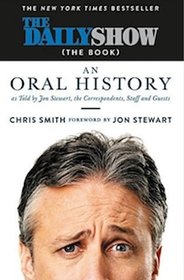
Rory Albanese (executive producer):
“The root of every Daily Show script, like the root of any good sitcom script or any story, is a narrative arc. This is another Jon Stewart-ism: ‘The jokes are easy. We’ve got a lot of funny people. We’ll get the jokes. You know what’s hard? Why the fuck are we talking about this, and what are we saying about it? What’s the arc? What is the essay that we’re structuring?’” (59).
Jon Stewart (star of Daily Show):
“Can I tell you the craziest thing? Tracey and I were walking that afternoon of 9/11, or it might have been the next day, in just the quiet of it. We didn’t really know where we were going, just walking, and we walked by a building and there was a little street mouse, I don’t even think it was a rat, a little street mouse. All of a sudden a dude—I guess it was the super in the building, we hadn’t seen him—fucking clubbed it right in front of us. I remember us just both bursting into tears, and we just kind of like . . . I just remember us bursting into tears on a constant basis, as everybody was. The smell is the things that I’ll never forget, just that was . . .” (72).
James Dixon (Stewart’s manager):
“‘Jon Always said, ‘I don’t need to be on a broadcast network to validate myself. I’ll do what I do for basic cable, and if I do it well it won’t matter where I do it from. That will be my legacy’” (85).
Ben Karlin (head writer and executive producer):
“It felt like we were crazy. How could we be the only people who were recognizing this ridiculous disparity? It became one of the signature things for the show to find these quotes and have people contradicting their own words, but in the early stages it felt pretty novel to do something like that so vividly with one person” (109).
Rakesh Agrawal (founder, SnapStream):
“What we invented was a unit that connects to a company’s computer server. One of them can record up to ten television shows at a time. The recordings you make can be watched on the network, from any desktop inside an organization, by multiple people at the same time. But for The Daily Show, the point is not really about watching TV. We translated the TV audio into text, and made it possible to search inside shows” (259).
“The original notion was to stage dueling rallies, with [Stephen] Colbert leading ‘The March to Keep Fear Alive.’ Instead it was merged into a single event, ‘The Rally to Restore Sanity and/or Fear.’ What never changed was the intention that Stewart announced on The Daily Show, to put on a pageant for noncrazy, non-book-and-flag-burning, nonscreaming America: ‘Not so much the Silent Majority as the Busy Majority.’ In other words, a plea for rationality in an increasingly irrational political and media landscape, a reminder that there’s a distinction between ‘political’ and ‘partisan.’ Plus Colbert in an Evel Knievel jumpsuit” (261).
Jessica Williams (correspondent, 2012-2016):
“But the first few months were really tough. The Daily Show, it had been on for a while, and I think people can be very possessive of the show. When I first started, I got . . . you know just . . . you know the negative racial comments in my inbox. You do anything that ruffles a few feathers on the show, there’s always going to be some racist dude ready to like call you a nigger, you know? I think a lot of it has to do with people just being really stupid . . . . At that time, it really bothered me a lot. Now, either I get it less or I just don’t give a shit anymore” (324).
“[Lewis] Black’s segments could still be wildly funny tangents about, say, artisanal crystal meth or the need for a Trump 2012 presidential campaign (‘This is what I’ve been waiting for my whole life, a president who’s not afraid to tell the truth about being a lying asshole!’), but over the years many of Black’s rants were vein-bulging exclamation points to The Daily Show’s main themes” (329).
Jon Stewart:
“So we also did a longer piece partly about how Fox [Network] was ‘outraged’ that Ferguson [Missouri] was being cast in racial terms. And I talked about how we’d recently sent a producer, Stu Miller, who was dressed like a homeless elf with a week’s worth of five o’clock shadow, and a correspondent, Michael Che, dressed in a tailored suit, out to do an interview—and how it was Che who got stopped by security. The point being, here’s how ubiquitous racism and indignity is. To Michael, this wasn’t ‘You’re not going to fucking believe what happened.’ It came up in the course of the conversation about other things. That’s what I meant in the piece when I said, ‘You’re tired of hearing about racism? Imagine how fucking exhausting it is living it” (351).
Ramin Hedayati (studio production, field producer):
“It became the first of the three big pizza rants—the other two were about Chicago deep dish, and then Mayor [Bill] de Blasio eating pizza with a fork. And they were funny and really silly. But they were also great illustrations of the show’s process.
Jon was all about the passion. He always said, ‘We need to make sure we’re channeling our emotions. What do we find joyous? What makes us have a strong emotional reaction? If something makes you angry, why? Bring that to the idea. If something’s just purely fun, let’s just have fun with it.’ He wants us to be writing to, and pitching to, that strong feeling. Plenty of times it’s outrage about something serious. But we don’t need to do the congressional takedown every night” (381).
Jon Stewart:
“And this, this, is their genius. Conservatives are not looking to make education more rigorous and informative, or science more empirical or verifiable, or voting more representative, or the government more efficient or effective. They just want all those things to reinforce their partisan, ideological, conservative viewpoint” (383).
A WRITER'S WIT |

A WRITER'S WIT |
I'VE MADE IT MY GOAL to read the entire oeuvre of late British-American author, Christopher Isherwood, over a twelve-month period. This profile constitutes the twenty-first in a series of twenty-four.
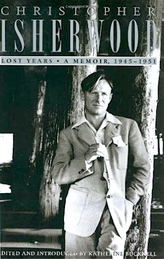
Editor Katherine Bucknell, from her Introduction: “Isherwood never gave up his writing as [Edward] Upward did; for he was a writer above all, not an activist, even when it came to his homosexual kind. By writing in explicit sexual detail about his intimate behavior and that of his close friends and acquaintances in the years immediately following the war, he was portraying the hidden energies and affinities of homosexual men all over the United States who during that period were gathering increasingly in certain, mostly coastal cities as peace and prosperity returned to a country much altered by vast wartime mobilization. This hidden social group, whose consciousness of itself as a group was intensified by the demographic shifts brought about by the war and then extended throughout the 1950s, was to emerge in its own right as a significant force of change in American and in western culture generally during the final third of the twentieth century. Much of this change began in southern California, and Isherwood was living at its source. His personal myth is part of, and in many ways emblematic of, the larger myth of the group to which he belonged: and his reconstruction of his life during the postwar years foretells much of what was to come” (xiv).
Writing about himself in the third person, CI says, helps him to separate himself from the “I” of the rest of his writing: “Isherwood would never cease to be aware of the way in which all success, and indeed all art, excludes or marginalizes somebody. In a sense, his art tries to do the opposite, but whatever is brought to the fore must push something else aside. As a schoolboy he had written to his mother: ‘I have an essay on “omission is the Beginning of all Art” which it may amuse you to see.’ And he explains at some length in Christopher and His Kind, much of the difficulty he had with his work, throughout his career, can be understood as his struggle with the question of how the artist decides what to leave out of his art. The subjects not chose, the themes not addressed, haunt the imagination with the pain of their rejection; for the novelist who feels a strong loyalty to historical fact, the necessity to omit is like the burden of original sin, a crime of neglect which must precede the possibility of artistic creation” (xxxiii).
Isherwood reveals a romantic notion has: “The rest of the day was spent at Bill’s La Cienega apartment. It seems to me now that La Cienega was perhaps the most romantic street in Los Angeles, in those days. It had an un-American air of reticence, of unwillingness to display itself. Its shops were small and unshowy; its private houses were private. Also—and this was what really appealed to Christopher—it seemed to have a bohemian, self-contained life of its own. It was a ‘quarter,’ which didn’t make any effort to welcome outside visitors. Many of its dwellers were hidden away in odd little garden houses and shacks, within courtyards or on alleys, behind the row of buildings which lined the street. It was in one of these that Bill lived” (15).
A bit of literary gossip: “Katherine Anne [Porter] treated them like favored nephews; she even cooked meals for them. Unfortunately, however, beneath Christopher’s deference and flattery, there was a steadily growing aggression. By her implicit claim to be the equal of Katherine Mansfield and even Virginia Woolf, Katherine Anne had stirred up Christopher’s basic literary snobbery. How dare she, he began to mutter to himself, this vain old frump, this dressed-up cook in her arty finery, how dare she presume like this! And he imagined a grotesque scene in which he had to introduce her and somehow explain her to Virginia, Morgan [Forster] and the others . . . [t]hus Katherine Anne became the first of an oddly assorted collection of people who, for various reasons, made up their minds that they would never see Christopher again. The others: Charlie Chaplin, Benjamin Britten, Cole Porter, Lincoln Kirstein” (68-9).
CI became acquainted with the famed Joseph Pilates, designer of physical education for compromised bodies, when CI joined the man’s gym: “Mr. Pilates was a bully and a narcissist and a dirty old man; he and Christopher got along very well. When Christopher was doing his workout, Pilates would bring one of his assistants over to watch, rather as the house surgeon brings an intern to study a patient with a rare deformity. ‘Look at him!’ Pilates would exclaim to the assistant, ‘That could have been a beautiful body, and look what he’s done to it! Like a birdcage that somebody trod on!’ Pilates had grown tubby with age, but he would never admit it; he still thought himself a magnificent figure of a man. ‘That’s not fat,’ he declared, punching himself in the stomach, ‘that’s good healthy meat!’ He frankly lusted after some of his girl students. He used to make them lie back on an inclined board and climb on top of them, on the pretext that he was showing them an exercise. What he really was doing was rubbing off against them through his clothes; as was obvious from the violent jerking of his buttocks” (120). Lust may be in the eye of the beholder!
CI on screenwriting, something he did to pay the bills: “Christopher had always been a model employee. He despised amateurs like Brecht who, when they condescended to work at a film studio, whined and sneered and called themselves whores or slaves. Christopher prided himself on his adaptability. Writing a movie was a game, and each game had a different set of rules. Having learned the rules, Christopher could play along with enjoyment—especially if he had a fellow player like Gottfried Reinhardt who was enjoying himself too. Once Christopher had accepted the fact that this game was to be played according to the Viennese code, he became almost as Viennese as Gottfried and Fodor. I have no doubt that some of the script’s most Viennese touches were contributed by him, though I can’t remember which they were” (152).
CI quotes author Cyril Connolly: “. . . the true function of a writer is to produce a masterpiece . . . no other task is of any consequence. Obvious though this should be, how few writers will admit it, or having made the admission, will be prepared to lay aside the piece of iridescent mediocrity on which they have embarked! Writers always hope that their next book is going to be their best, for they will not acknowledge that it is their present way of life which prevents them from ever creating anything different or better” (275).
A WRITER'S WIT |
 Emiliano Ponzi
Emiliano Ponzi A WRITER'S WIT
I have discovered that most of the beauties of travel are due to the strange hours we keep to see them . . . .
William Carlos Williams
Born September 17, 1883

A WRITER'S WIT
You can make an audience see nearly anything, if you yourself believe in it.
Mary Renault
Born September 4, 1905
A WRITER'S WIT
“A few times in my life I’ve had moments of absolute clarity. When for a few brief seconds the silence drowns out the noise and I can feel rather than think, and things seem so sharp and the world seems so fresh. It’s as though it had all just come into existence. I can never make these moments last. I cling to them, but like everything, they fade. I have lived my life on these moments. They pull me back to the present, and I realize that everything is exactly the way it was meant to be.”
Christopher Isherwood, from his novel, *A Single Man*
Born August 26, 1904

“I knew that there is something sad and faintly distasteful about love’s ending, particularly love that has never been fully realized. I might have hinted at that, but I doubt it. In our deepest moments we say the most inadequate things” (143).
“Then she knelt, and as she began he muttered between clenched teeth. He who could tame animals was defenseless in this. She applied herself to it, sucking, sucking, sucking, with all the hunger that she felt and all the simulated hunger that she liked him to think she felt” (214).
“She had joined that small sodality of scandalous women who had conceived children without securing fathers and who were damned in body and soul. Had they convened they would have been a band of seven or eight, and might have sent up an unholy wail to their Maker and their covert seducers” (252).
A WRITER'S WIT
Each wrong act brings with it its own anesthetic, dulling the conscience and blinding it against further light, and sometimes for years.
Rose Macaulay
Born August 1, 1881
| August 4, 2014, Paul Theroux, “Action”: Albert, the fifteen-year-old son of a Boston shoe store owner, runs an errand for his father in the late 1950s and faces some unforeseen hazards. ¶ Danger seems to lurk everywhere, whether it’s a man that steals his dime pastry or a store owner who asks Albert if he want to get “bollocky” and have his picture taken. Albert’s friend Eddie has told him about his girl, Paige, who is twenty, stating that she’s “action.” After attending to his father’s errand of picking up some shoes, Albert stops to visit Paige at her flat. She is ironing and offers him some lemonade. Having survived the previous perils, Albert |
June 2024
May 2024
April 2024
March 2024
February 2024
January 2024
November 2023
October 2023
September 2023
August 2023
June 2023
May 2023
April 2023
March 2023
February 2023
January 2023
December 2022
November 2022
October 2022
September 2022
August 2022
July 2022
June 2022
May 2022
April 2022
March 2022
February 2022
January 2022
December 2021
November 2021
October 2021
September 2021
August 2021
July 2021
June 2021
May 2021
April 2021
March 2021
February 2021
January 2021
December 2020
November 2020
October 2020
September 2020
August 2020
July 2020
June 2020
May 2020
April 2020
March 2020
January 2020
December 2019
November 2019
October 2019
September 2019
August 2019
July 2019
January 2019
December 2018
November 2018
October 2018
September 2018
August 2018
July 2018
May 2018
April 2018
March 2018
February 2018
January 2018
December 2017
November 2017
October 2017
September 2017
August 2017
July 2017
June 2017
May 2017
April 2017
March 2017
February 2017
January 2017
December 2016
November 2016
October 2016
September 2016
August 2016
July 2016
June 2016
May 2016
April 2016
March 2016
February 2016
January 2016
December 2015
November 2015
October 2015
September 2015
August 2015
July 2015
June 2015
May 2015
April 2015
March 2015
February 2015
January 2015
December 2014
November 2014
October 2014
September 2014
August 2014
July 2014
June 2014
May 2014
April 2014
March 2014
February 2014
January 2014
December 2013
November 2013
October 2013
September 2013
August 2013
July 2013
June 2013
May 2013
April 2013
March 2013
February 2013
January 2013
December 2012
November 2012
October 2012
September 2012
August 2012
July 2012
June 2012
May 2012
April 2012
March 2012
February 2012
January 2012
December 2011
November 2011
October 2011
September 2011
All
Acting
Actors
African American History
Aging
Alabama
Alaska
Aldo Leopold
Andy Warhol
Arizona
Arkansas
Art
Atrial Fibrillation
Authors
Authors' Words
Barcelona
Blogging About Books
Blogs
Books
California
Cancer
Cars
Catalonia
Colorado
Cooking
Creative Nonfiction
Culinary Arts
Deleting Facebook
Ecology
Education
Environment
Epigraphs
Essays
Fiction
Fifty States
Film
Florida
Georgia
Grammar
Greece
Gun Violence
Hawaii
Heart Health
Historic Postcards
History
Humor
Idaho
Iowa
LGBTQ
Libraries
Literary Biography
Literary Journals
Literary Topics
Literature
Maine
Massachusetts
Memoir
Michigan
Minnesota
Mississippi
M K Rawlings
Musicians
Nevada
New Hampshire
New Mexico
New Yorker Stories
Nonfiction
North Carolina
Novelist
Ohio
Pam Houston
Parker Posey
Photography
Playwrights
Poetry
Politics
Psychology
Publishing
Quotations
Race
Reading
Recipes
Seattle
Short Story
South Carolina
Spain
Susan Faludi
Teaching
Tennessee
Texas
Theater
The Novel
Travel
Travel Photographs
True Crime
#TuesdayThoughts
TV
U.S.
Vermont
Voting
War
Washington
Wisconsin
World War II
Writer's Wit
Writing